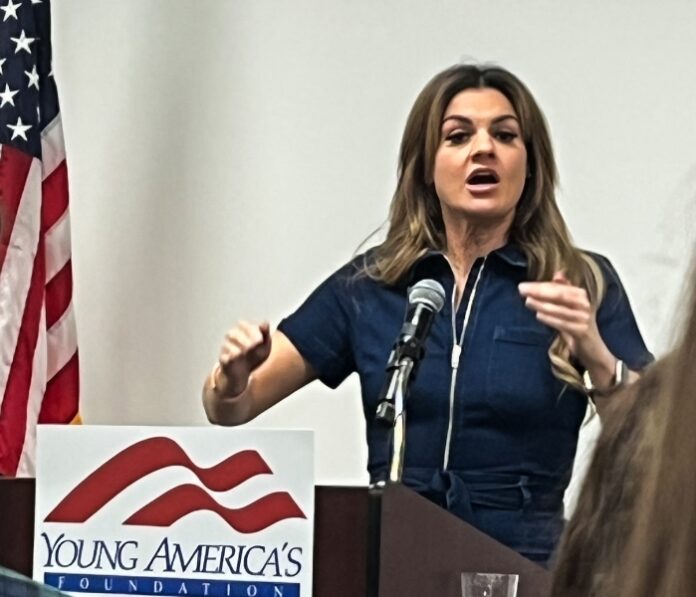
Abby Johnson’s Message to the Pro-life Generation
Disclaimer: All articles published under this section are the opinions of the respective authors and do not necessarily reflect the opinions of The Cor Chronicle.
Last Wednesday, Crusaders for Life and Young Americans for Freedom co-hosted a talk by Abby Johnson, whose book “Unplanned” was the inspiration behind the award-winning movie of the same name.
The former Planned Parenthood clinic director, now a pro-life activist, arrived on campus to a welcoming multitude of over 200 University of Dallas students excitedly crowding SB Hall. Johnson’s message was clear, her testimony poignantly beautiful and more than a few tears were shed by those present.
What was especially stirring, however, was Johnson’s exhortation to each of us students to remain ever-wary of the lies our culture tells us about life, love and happiness.
When asked about what inspires her about parenting, Johnson responded, “The reality is that being a mother is the most fruitful, fulfilling choice that a woman makes, and the pro-abortion movement has equated it with slavery… My goal is to reverse that language.” As a mother of eight herself, Johnson speaks from experience.
At Blessed is She the following night, Nov. 7, Dr. Elizabeth Heyne felicitously gave a talk on holistic sexuality (a subject which is beneficial to the XY’s as much as to the XX’s). During the talk, Heyne spoke of the negative impact which childhood abuse causes to the brain’s development and function throughout life. This damage is not limited to physical abuse, but is due also to broken homes and especially to broken marriages.
If Johnson’s experience of parenthood has been fulfilling, the opposite can be said for parents in broken homes. Divorce or cohabitation statistics are irrelevant in light of the frankly logical assertion that unmarried couples cannot, and do not, have success in maintaining a stable, happy family.
The very word “broken” may apply to the structure of the family as much as to the hearts of children which fail to witness any true devotion between mom and dad during childhood, and proceed to carry this inexperience into their own future relationships. Thus, the cycle of brokenness perpetuates, unless direct efforts are made to establish new order in the relationship between parent and child.
“It doesn’t look as flashy on the surface, but I think that being a good mom or dad can be the most powerful thing in fighting for the pro-life movement,” said Crusaders for Life President Martha Depew.
As college students, maybe we aren’t married with children yet, but every one of us with a parent or two can attest that their presence was the first and most dominant force of our young lives. In a loving home, which I pray you have had, the love of your mom and dad was all that mattered as a young child and endured into your later years as a reminder of what love could look like for you.
With this in mind, I challenge you to imagine what life was like for your parents. You were there, but you probably don’t remember the countless diaper changes, late-night scream fests, picky-eater coaxes and fights with cousin Billy fail-safe.
You weren’t there, but you were probably only a few rooms away when mom and dad fought over the bills, wept together at the loss of a relative and coordinated who was going to take the next night shift to rock you to sleep.
St. John Paul II said, “Your being increases in the measure that you give it away.” If this is true, then parents certainly reap the greatest rewards for what they sow, not only in each other’s lives, but in the lives of their children.
Principled parenthood may be a slow and inconspicuous remedy to abortion, but like any good medicine, the results are as sure as the process is invisible. The Biblical exhortation of Genesis 1:28 to “be fruitful and multiply” refers not only to bearing children, but also to the fruitfulness of love – and a loving family.
Let us all resolve, therefore, if we are called to the wondrous vocation of married life, to truly give away our being so as to flourish, remembering that the most complete reversal of a culture of death is a culture of love.
Rebecca Dalsass is a junior English major. She is an officer for the Thomistic Institute at the University of Dallas. –